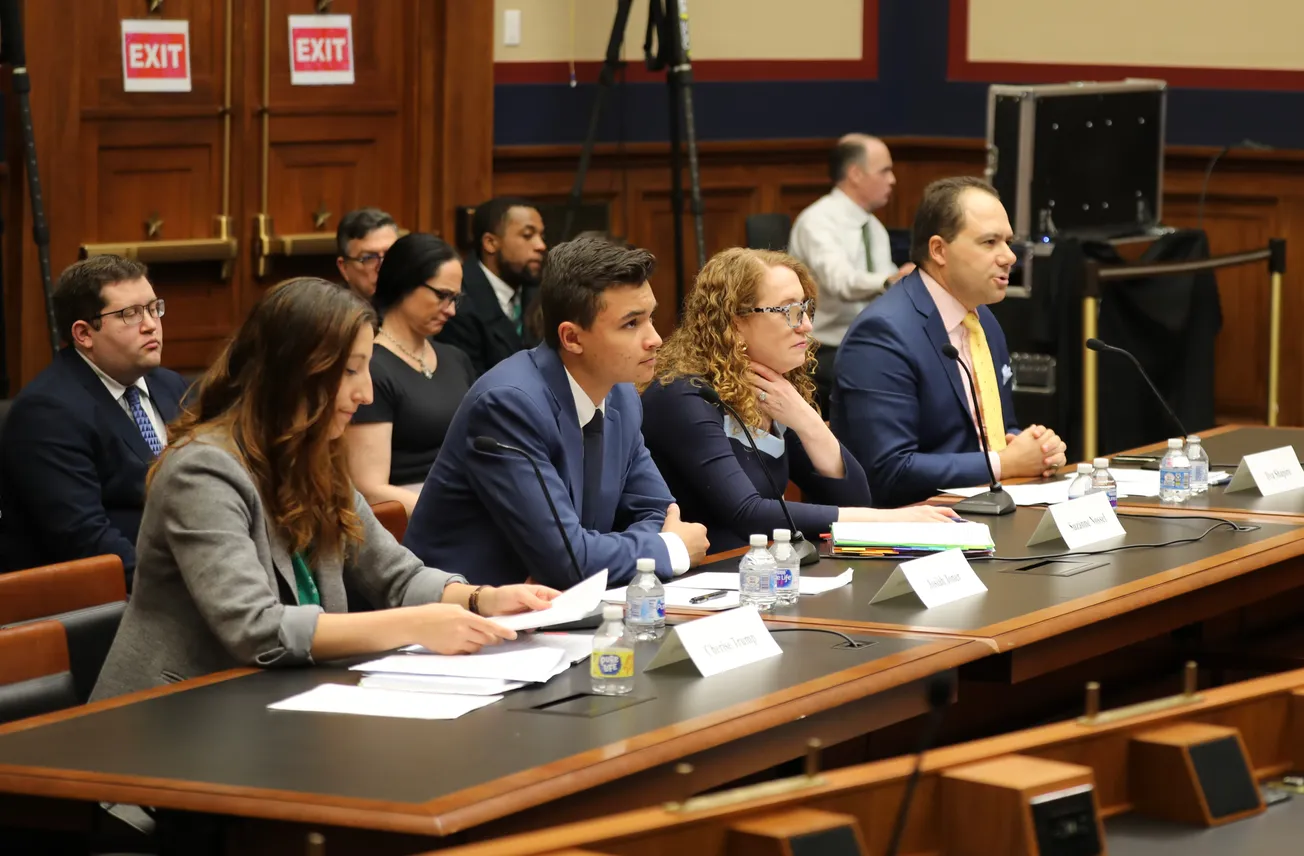Table of Contents
Last week, amid recent events that have threatened free speech on college campuses across the country, including just last month at Stanford Law School, the U.S. House of Representatives Subcommittee on Higher Education and Workforce Development held a hearing on free speech on college campuses titled “Diversity of Thought: Protecting Free Speech on College Campuses.” I had the opportunity to represent the Review and talk about the importance of free speech before Congress.
I testified alongside Cherise Trump, the Executive Director of Speech First; Suzanne Nossel, the CEO of PEN America; and Ilya Shapiro, a fellow at the Manhattan Institute. Despite different ideological beliefs and partisan affiliations, the four of us were united in highlighting the dangerous pattern of disregard and assaults on free speech at colleges and universities across the country. I was encouraged by the efforts of both Republicans and Democrats to protect free speech, as it is important that Congress take concrete action to uphold diversity of thought on college campuses to ensure that our institutions remain centers of free speech and learning.
In my testimony, I discussed the recent protests against Judge Kyle Duncan at Stanford Law School and reflected on my own experiences as a student. I shared with the committee what I have personally witnessed during my time here at Stanford: a suppression of open debate in classrooms out of a fear of standing out ideologically, a fear often fueled by the administrators themselves. I pointed to the example at Stanford Law School, and how the actions by administrators like Dean Steinbach lead to both conservative and liberal students keeping quiet in the classrooms—too scared to make any point that might be perceived as controversial. Rigorous intellectual debate, the very purpose of these institutions, has been exiled from university classrooms which degrades the quality of higher education (fortunately this debate can still be found at the Review!).
The question of how to protect free speech on college campuses is difficult to answer. The power of governments to uphold free speech on college campuses can only reach so far. Furthermore, it is reasonable to expect that college students will push the boundaries of university policies—including policies regarding free speech. As a result, the surest way to produce a healthy campus culture is to have administrators in place committed to free expression and to educate students on these principles. College is a time for students to explore their interests and learn, but without students educated on these issues and administrators committed to one of the most important principles of intellectual debate, the next generation of leaders is in peril. Perhaps the Wall Street Journal Editorial Board said it best: “If universities want to reclaim real intellectual openness on campus, they have to help students get comfortable with being uncomfortable.”
Thankfully, what is evident from the hearing is that protecting free speech has bipartisan support. I admire Suzanne Nossel, the Democratic witness at the hearing, for vigorously defending free speech in some of the most difficult instances. However, while there seems to be bipartisan and university administrative support to uphold the principle of free speech on college campuses, it also seems that not much actually changes in practice.
There is a cycle in which assaults on free speech are followed by an official university apology… only for another attack on free speech to happen again down the road shortly after. As we have requested from Stanford, we need the university to take concrete actions to uphold free speech on our campus. Stanford appears to be moving in the right direction.
Shortly after the incident at the law school, President Marc Tessier-Lavigne and Stanford Law School Dean Jenny Martinez issued a joint apology to Judge Duncan. Later, Dean Martinez released a ten-page letter to the law school community, announcing that Dean Steinbach had been placed on leave and affirming her commitment to free speech and outlining actions to protect it at the law school, including a mandatory half-day session on free speech. Then, just this week, President Tessier-Lavigne sent an email to the entire Stanford campus, reaffirming his “commitment to academic freedom and to the expression of diverse viewpoints.” The actions of Stanford’s leadership, specifically President Tessier-Lavigne and Dean Martinez, to protect free speech on campus are a model for universities across the country.
As was the center of the incident at Stanford Law School, Stanford must ensure that its administrators they hire are truly committed to this principle of free speech, which is even embedded in the university’s own policies. They must take steps to educate their students to demonstrate that freedom of speech is truly a “bedrock principle” of the university, as they do with the university’s other guiding principles. Until Stanford and other colleges across the country not only verbally reaffirm their commitment to free speech, but actively work to shift a campus culture that has degraded free expression and rigorous intellectual debate, we will only see a continued trend of assaults on free speech.









